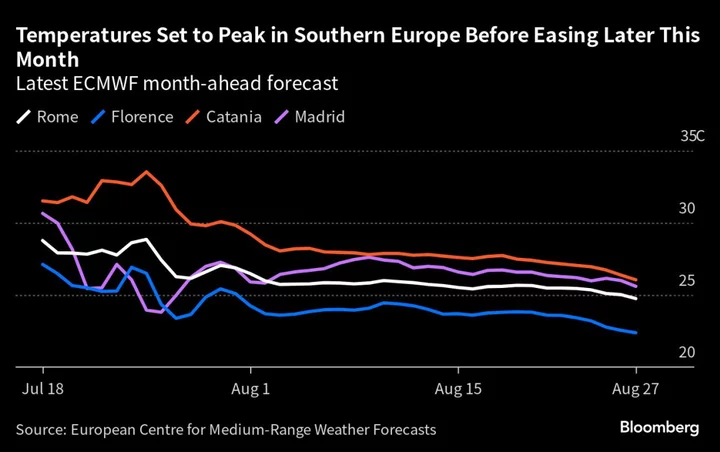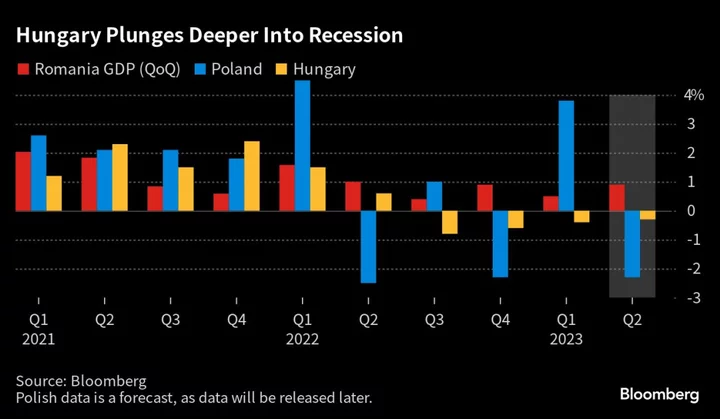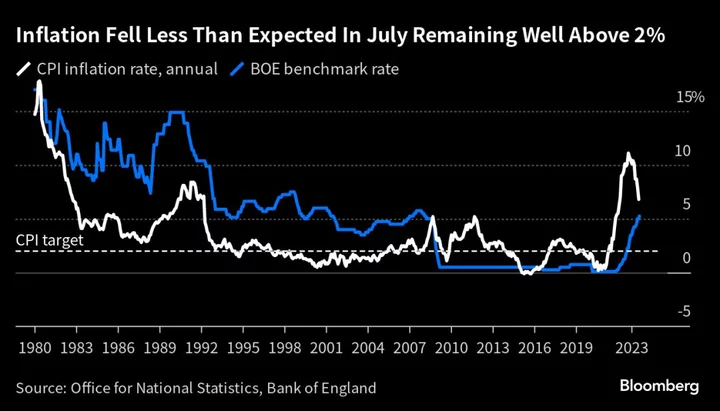Europe’s extreme heat is triggering wildfires from Greece to Switzerland, as Spain’s Catalonia region recorded its highest ever temperature.
The European Union is sending four firefighting planes from France and Italy to assist Greece, as blazes that destroyed homes outside Athens are still burning. In La Palma in Spain’s Canary Islands, some of the more than 4,000 people who fled their homes at the weekend are returning after another fire was brought under control. In the Swiss Alps, several villages have been evacuated due to a forest fire in the canton of Valais.
Fires are breaking out as another blast of heat from the Sahara envelops the Mediterranean, bringing an all-time high of 45C (113F) to Catalonia on Tuesday. The World Meteorological Organization, which verifies extreme temperatures, has said Europe’s record of 48.8C, set in Sicily two years ago, could be tested.
The heat that’s stifling southern Europe is being repeated across the Northern Hemisphere, as global warming triggers extreme weather events from the US to China. That risks becoming the “new normal,” underlining the urgency of cutting greenhouse gas emissions, the WMO has said.
A fire outside Athens that destroyed homes is still burning on Tuesday, while the smoke from blazes in Canada risks the health of vulnerable people in New York and Washington.
The blaze in Loutraki — an area west of the Greek capital that’s popular with Athenians who want a second home close to the beach — has flared up again. Strong winds have brought another wildfire that was burning about 50 kilometers (31 miles) north of Athens in Dervenoxoria, closer to the city, destroying homes and threatening businesses.
Other fires in areas southeast of Athens have been quelled by firefighters using jets and helicopters. Residents and children from summer camps were evacuated to the nearest beaches on Monday.
The International Federation of Red Cross and Red Crescent Societies warned on Tuesday of the increasing frequency and intensity of heatwaves, after 400,000 people died over the past decade from extreme climate and weather-related disasters.
“Heatwaves are an invisible killer,” Panu Saaristo, IFRC Emergency Health Unit team leader, said at a briefing in Geneva. “Infants, the elderly, and people with chronic health conditions are at particular risk.”
Italy’s ministry of health warned of emergency heat wave conditions in 20 major cities, including Rome and Florence.
The country’s civil protection has set up 28 “heat help points” in Rome, including at the Colosseum, where temperatures are expected to reach 42C on Tuesday. About 80 volunteers are offering people water and empty bottles to be filled from the city’s fountains.
Other Impacts of Heatwave in Italy:
- In Rome, rock band Muse postponed the beginning of its concert to avoid people queuing in the heat.
- In Naples, emergency room admissions at Caldarelli hospital are up 30%, mainly from older people suffering from dehydration and other heat-related symptoms, according to Corriere della Sera.
- Union leader Maurizio Landini asked the government to amend labor rules and working hours to take account of extreme weather conditions.
The heatwave is also disrupting power and transport systems across the region. In Italy, power consumption is expected reach a peak for this year on Tuesday.
In France, the operations of the country’s nuclear fleet could be curbed as warming rivers mean water can’t be used to cool some reactors without threatening fish and other wildlife. The heatwave alert for seven regions in the southeast of France has been extended into Wednesday by the nation’s meteorological agency.
It’s not only the land that’s heating up. The sea around the Iberian Peninsula is currently about 2C higher than the average, with parts of the Mediterranean reaching 28C, according to Spain’s national weather forecaster.
There’s a very different outlook for northern Europe, where temperatures remain below seasonal averages. The UK and the Nordics will experience cooler weather through the next 10 days, with Stockholm more than 5C below the norm on Thursday, according to forecaster Maxar Technologies Inc.
--With assistance from John Ainger, Flavia Rotondi, Alessandro Speciale and Laura Millan.
Author: Priscila Azevedo Rocha, Eamon Akil Farhat and Sotiris Nikas









